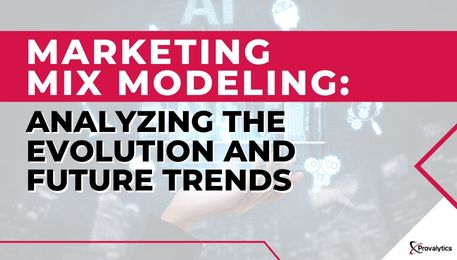Marketing Mix Modeling: Analyzing the Evolution and Future Trends
Marketing mix modeling (MMM) has changed dramatically in recent years, owing to the necessity to react to the changing landscape of marketing approaches and consumer behavior. Experts in the field offer light on the shifts taking place in MMM and its implications for the future.
The development of digital marketing strategies has been a significant driver of MMM transformation. Marketers are more focused on understanding the integration and synergies between diverse techniques as new ways to engage clients emerge. The goal is to maximize promotional investment and manage resources wisely. The need for more detailed measures and return on investment (ROI) analysis has resulted from the push to attain optimal results. Companies are now segmenting analytics by certain channels or partners to acquire a better understanding of their success.
🚀 Yes, I Want The 2024 Playbook!
Transformation of Marketing Mix Modeling (MMM) in the Digital Age
The technical approach to modeling has also changed significantly. Data collection has gotten more extensive and granular, necessitating the addition of new variables in order to capture nuanced information. Marketers, for example, now examine the themes mentioned at peer-to-peer speaker programs when analyzing these events. Modeling the interdependence of various promotion strategies, such as detailed and speaker programs, has also become critical. Furthermore, the focus has evolved away from evaluating overall sales impact and toward measuring new patient beginnings and therapy adherence, particularly in the context of speciality and uncommon diseases.
The Role of Artificial Intelligence and Machine Learning (AI/ML) in MMM Transformation
Artificial intelligence and machine learning (AI/ML) are becoming more prominent in MMM. AI/ML approaches enable researchers to acquire a better understanding of patient behavior and the impact of advertisements on healthcare personnel. Marketers can identify relationships more successfully if they understand the decision-making processes of patients and physicians. Using AI/ML to analyze massive datasets and detect patterns is critical to gaining these insights.
MMM’s intricacy and scale need the use of software and tools. To answer larger and more complicated regression equations, the developing landscape need computational speed and tractability. Efficient extract, transform, and load (ETL) technologies are required for dealing with large and heterogeneous data sources. Third-party technologies are available to help these processes and streamline MMM project implementation.
Budget allocation within MMM has also changed. Optimization studies are carried out to assess how additional cash might be strategically distributed across various methods. Furthermore, due to higher returns on digital marketing spending, there is a growing trend of increased investment in digital channels. In these budget negotiations, the emphasis is on maximizing ROI and efficient resource allocation.
Looking ahead, there are several intriguing things in MMM’s future. Integrating short-term analytics, such as next-best-action models, with MMM will improve the ability to make optimal decisions more quickly. Furthermore, the usage of AI/ML techniques will become more prevalent, particularly in the analysis of patient-related data. MMM is intended to expand into a cross-portfolio tool, allowing businesses to evaluate marketing efforts holistically rather than in silos.
Analysts and business users’ roles in MMM are also evolving. It is no longer sufficient to display numbers; instead, critical insights and results must be extracted and interpreted in the context of the business story. Understanding why ROI varies, spotting changes in message or the market environment, and making actionable recommendations based on the data are all important characteristics for analysts and business users.
The necessity to adapt to digital marketing approaches, leverage AI/ML methodologies, and maximize resource allocation is driving the evolution of MMM. MMM will become more integrated with short-term analytics, make greater use of AI/ML tools, and turn toward cross-portfolio analysis in the future. As the sector evolves, marketers must be aware of these developments and use the insights offered by MMM to improve business outcomes.
How has the development of digital marketing strategies impacted the transformation of MMM?
Digital marketing strategies have played a significant role in driving the transformation of MMM by focusing on understanding the integration and synergies between diverse techniques to engage clients effectively.
What are some of the key changes in the technical approach to modeling in MMM?
The technical approach to modeling in MMM has evolved with more extensive and granular data collection, including the addition of new variables to capture nuanced information. Marketers now analyze themes mentioned at peer-to-peer speaker programs, and modeling the interdependence of various promotion strategies has become critical.
How has the focus of MMM shifted from evaluating sales impact to measuring other factors?
The focus of MMM has shifted away from evaluating overall sales impact and towards measuring new patient beginnings and therapy adherence, especially in the context of specialty and uncommon diseases.
Why are artificial intelligence and machine learning (AI/ML) becoming more prominent in MMM?
AI/ML approaches are becoming more prominent in MMM because they enable researchers to gain a better understanding of patient behavior and the impact of advertisements on healthcare personnel. AI/ML helps identify relationships by analyzing massive datasets and detecting patterns.
What are the implications of MMM’s evolution for analysts and business users?
The role of analysts and business users in MMM is evolving to go beyond displaying numbers. They need to extract critical insights, interpret results in the context of the business story, understand variations in ROI, identify changes in messaging and the market environment, and make actionable recommendations based on the data.


